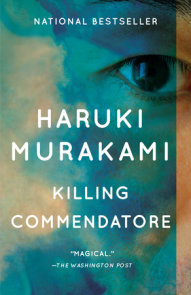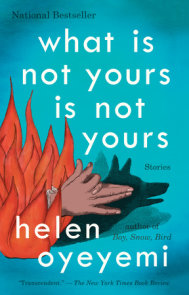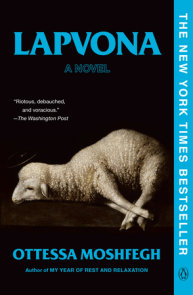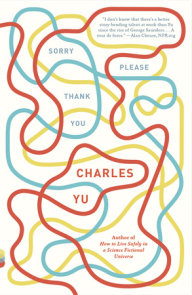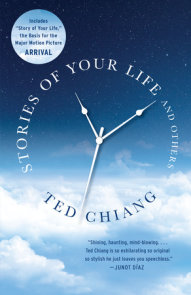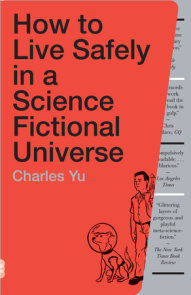READERS GUIDE
The introduction, discussion questions, and suggested further reading that follow are designed to enhance your group’s discussion of 1Q84, the magnum opus of critically acclaimed and best-selling novelist, Haruki Murakami, author of The Wind-Up Bird Chronicle, Norwegian Wood, and Kafka On the Shore.Introduction
Set in 1984, Haruki Murakami’s expansive new novel tells the story of the deeply intertwined fates of its two remarkable protagonists, Tengo and Aomame.Tengo and Aomame were grade school classmates who experienced a moment of mystical union when Aomame, a girl shunned for belonging to a fringe religious group, suddenly seized Tengo’s hand and looked deeply into his eyes. Their paths diverged shortly after Aomame’s impulsive and ambiguous gesture, but each was left profoundly changed by it. For the next 20 years, they are held in the gravitational pull of this brief moment of connection.
Now they are nearly thirty. Tengo is a math teacher and unpublished novelist, drifting rather aimlessly through his life, with no clear sense of purpose or ambition. Aomame is a fitness instructor, bodyworker and, most importantly, an assassin of men who have violently abused their wives.
When Komatsu, an unscrupulous and cynical editor, asks Tengo to rewrite a story by 17-year-old Fuka-Eri so that it can be considered for a major literary prize, Tengo realizes he’s entering into a devil’s bargain. But he’s so taken with the story that he is unable to resist Komatsu’s offer. Accepting the task opens up a Pandora’s box of perils that far surpass even Tengo’s and Komatsu’s worst fears. The novel, Air Chrysalis, becomes an immediate best seller, attracting widespread media attention that threatens to uncover Komatsu’s and Tengo’s scam. More ominously, the novel has aroused the ire of the “little people,” a malevolent group of other-worldly miniature spirits.
Aomame meanwhile has her own secrets. Employed by an elderly dowager, she stealthily and expertly murders men who have abused their wives but remain unprosecuted. When she accepts the assignment to kill the heavily protected leader of Sakigake, the very religious cult that Fuka-Eri had fled and written about in Air Chrysalis, she too enters a world of danger she never could have imagined. She has literally entered another world, one that is nearly identical to the ordinary world of 1984 except that it has two moons in the sky. And in this new world, the flow of time—and rules of reality—have been subtly altered.
Blurring the line between possible and impossible, linear and non-linear time, fiction and reality, fate and free will, 1Q84 is both a metaphysical mind-teaser and a fast-paced thriller where the stakes for Tengo and Aomame couldn’t be any higher. Murakami’s most ambitious novel to date, 1Q84 is also an extraordinary love story, a story about the power of a single moment of deep connection to transcend time and space—and justify even the greatest of risks.
Questions and Topics for Discussion
1. 1Q84 is a vast and intricate novel. What are the pleasures of reading such a long work, of staying with the same characters over such a long period of time?
2. Murakami has said he is a fan of the mystery writer Elmore Leonard. What elements of the mystery genre does 1Q84 employ? How does Murakami keep readers guessing about what will happen next? What are some of the book’s most surprising moments?
3. Why would Murakami choose to set his story in 1984, the year that would serve as the title for George Orwell’s famous novel about the dangers of Big Brother?
4. The taxi driver in Chapter 1 warns Aomame that things are not what they seem, but he also tells her: “Don’t let appearances fool you. There’s always only one reality” (p. 9). Does this statement hold true throughout the novel? Is there only one reality, despite what appears to be a second reality that Aomame and Tengo enter?
5. Aomame tells Ayumi: “We think we’re choosing things for ourselves, but in fact we may not be choosing anything. It could be that everything’s decided in advance and we pretend we’re making choices. Free will may be an illusion” (p. 192). Do the events in the novel seem fated or do the characters have free will?
6. When Tamaru bids goodbye to Aomame, he says: “If you do go somewhere far away and I never see you again, I know I’ll feel a little sad. You’re a rare sort of character, a type I’ve seldom come across before” (p. 885). What type of person is Aomame? What qualities make her extraordinary?
7. The dowager insists, and Aomame agrees, that the killing they do is completely justified, that the men whom they kill deserve to die, that the legal system can’t touch them, and that more women will be victims if these men aren’t stopped. Is it true that Aomame and the dowager have done nothing wrong? Or are they simply rationalizing their anger and the desire for vengeance that arises from their own personal histories?
8. Tengo realizes that rewriting Air Chrysalis is highly unethical and that Komatsu is asking him to participate in a scam that will very likely cause them both a great deal of trouble. Why does he agree to do it?
9. How does rewriting Air Chrysalis change Tengo as a writer? How does it affect the course of his life?
10. How do the events that occur on the night of the huge thunderstorm alter the fates of Aomame, Tengo, Fuka-Eri, and the dowager? Why do Aomame and the dowager let go of their anger after the storm?
11. At first, Ushikawa is a creepy, totally unlikable character. How does Murakami make him more sympathetic as the novel progresses? How do you respond to his death?
12. Near the end of the novel, Aomame declares: “From now on, things will be different. Nobody else’s will is going to control me anymore. From now on, I’m going to do things based on one principle alone: my own will” (p. 885). How does Aomame arrive at such a firm resolve? In what ways is the novel about overcoming the feeling of powerlessness that at various times paralyzes Aomame, Ayumi, Tengo, Fuka-Eri, and all the women who are abused by their husbands? What enables Aomame to come into her own power?
13. What does the novel as a whole seem to say about fringe religious groups? How does growing up in the Society of Witnesses affect Aomame? How does growing up in Sakigake cult affect Fuka-Eri? Does Leader appear to be a true spiritual master?
14. What is the appeal of the fantastic elements in the novel—the little people, maza and dohta, the air chrysalis, two moons in the sky, alternate worlds, etc.? What do they add to the story? In what ways does the novel question the nature of reality and the boundaries between what is possible and not possible?
15. What makes the love story of Tengo and Aomame so compelling? What obstacles must they overcome to be together? Why was the moment when Aomame grasped Tengo’s hand in grade school so significant?
16. In what ways does 1Q84 question and complicate conventional ideas of authorship? How does it blur the line between fictional reality and ordinary reality?
17. References to the song “Paper Moon” appear several times in the novel. How do those lyrics relate to 1Q84?
18. What role does belief play in the novel? Why does Murakami end the book with the image of Tengo and Aomame gazing at the moon until it becomes “nothing more than a gray paper moon, hanging in the sky” (p. 925)?











